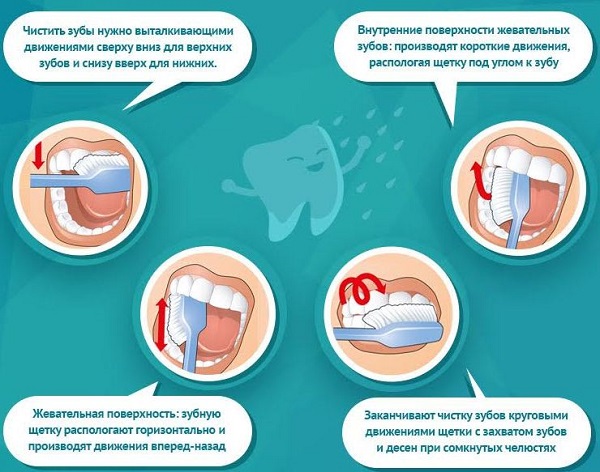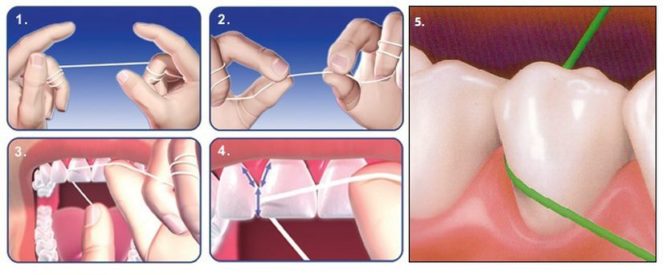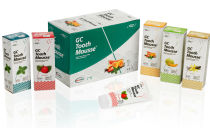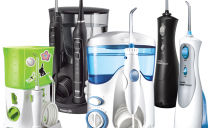Dental and oral care rules
Oral and dental care is a mandatory hygiene procedure. In its absence, food residues accumulate in the mouth, becoming a breeding ground for bacteria, which provoke the development of a variety of dental diseases. Among them are caries, gingivitis, periodontitis, stomatitis.
Content
What will happen if you do not brush your teeth
If you brush your teeth irregularly, plaque forms on the enamel. A thin layer of soft plaque, which can be easily washed off with plain water, occurs on the teeth within a few hours after brushing. The more plaque in the interdental space, the higher the likelihood of tooth decay.
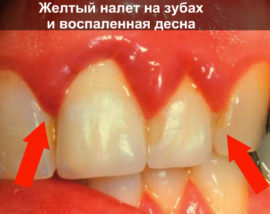 After a short time, soft plaque is converted into hard tartar, which cannot be cleaned on its own. If you do not go to the dentist for professional brushing, the stone will destroy the enamel and injure the gums, causing them to bleed.
After a short time, soft plaque is converted into hard tartar, which cannot be cleaned on its own. If you do not go to the dentist for professional brushing, the stone will destroy the enamel and injure the gums, causing them to bleed.
Anyone who does not brush his teeth causes irreparable harm not only to them, but to the whole body. Propagating in the mouth, bacteria provoke the formation of caries, periodontitis, tonsillitis, otitis media and other diseases, since they have the property of “traveling” through the body. Often, chronic throat diseases are associated precisely with a lack of oral hygiene. In this case, an infection is constantly present in the oropharynx, which periodically provokes inflammation of the tonsils.
Bacteria can penetrate the soft tissues of the gums and contribute to the development of gingivitis. A classic sign of the development of this pathology is blood released during brushing.
With poor quality oral hygiene, it starts to smell badly from the mouth. This smell is not so unpleasant as putrid, which occurs during serious inflammatory processes in the mouth, but also quite noticeable. At first, you can get rid of it by chewing ordinary mint chewing gum. But over time, the smell becomes persistent and more pronounced.
Lack of oral hygiene leads to tooth loss. When this happens is a matter of time and heredity. Comprehensive care for teeth and gums is required by all, without exception.
Oral Care Rules
Proper and regular oral care should include:
- cleansing the surface of the tongue;
- brushing your teeth;
- cleansing the interdental spaces;
- gum care.
Rules for cleaning the tongue
The tongue should be cleaned 2 times a day (evening and morning) during traditional hygiene procedures. To guaranteed to clear the tongue of plaque and dirt, you need to use specialized devices:
- scraper;
- dental spoon;
- special brush with a roller.
You can use a regular brush, if on the side opposite to the bristles there is a ribbed surface designed to cleanse the tongue.
The tongue needs to be cleaned with calm sweeping movements from the base to the tip. You can lightly press on the scraper, dental spoon or brush. But not too much so as not to injure the organ of taste.
If you do not clean the tongue, a white or grayish coating will accumulate on its surface, consisting of particles of food, saliva and bacteria, which contribute to the development of various inflammatory processes.
High-quality curettage of the surface of the tongue will help to cope with halitosis - bad breath.In addition, the purification of the organ of taste from plaque stimulates taste buds, so that food becomes several times tastier.
How to brush your teeth
Standard toothbrushing consists of several stages. First you need to rinse the toothbrush with warm, preferably boiled water. This must be done even if the accessory is stored in a case. Then squeeze a little paste on the brush (the size of a pea).
It is necessary to begin to clean the dentition with the third molars of the upper jaw, carefully moving forward. The brush should be at an angle of 45 degrees to the outer tooth surface. Sweeping movements must be performed from the gums to the tooth margin. If you violate this rule, food debris may clog under the gum.
Then you need to clean the inner surface of the teeth in a similar way. To better clean the interdental spaces in the area of canines and incisors, the toothbrush should be placed perpendicular to the dental row.
The teeth on the lower jaw are cleaned in the same way as on the upper: you need to make the correct sweeping movements from their base to the edge. The procedure is completed by cleaning the front surface of all teeth in circular motions with closed jaws. At the norm enamel brushing should last at least 2-3 minutes.
The effectiveness of dental and oral care depends on the quality of the brush used. The criteria for her selection are determined by the state of enamel:
- with increased sensitivity of enamel and bleeding gums recommended brushes with soft bristles;
- in the absence of dental problems, brushes with medium hard bristles can be used;
- if there are dentures in the mouth, it is better to buy a brush with hard bristles.
An electric toothbrush can only be used after consulting a dentist.
Flossing Tips
To properly clean the interdental spaces, dental flosses are used. In the presence of periodontal diseases, you need to use simple waxed threads, which are almost impossible to damage the mucous membrane of the gums. In the presence of inflammatory processes in the mouth, flosses coated with antibacterial compounds should be used. You can also use special fluorinated threads, but first it is recommended to consult a doctor.
Dental floss can only be used with normal interdental spaces. With crowding of teeth, the use of floss is undesirable, since enamel and gums can be damaged.
Using a special oral balm
Rinsing the oral cavity with hygienic balms is indicated in the following cases:
- there are chronic dental diseases;
- prostheses are installed;
- Enamel sensitivity increased;
- a person drinks coffee or tea every day;
- after removal of the dental unit.
Oral balms are therapeutic and prophylactic. The first should be prescribed by a doctor, the second can be used without medical indications.
Dental Disease Prevention
Oral hygiene includes preventive measures carried out in the clinic of dentistry and at home. They reduce the risk of gum and tooth diseases.
Preventive procedures include:
- diet and refusal of acidic foods;
- smoking cessation;
- warm food intake;
- regular visits to the dentistry clinic (at least once every 6 months).
Some tooth pathologies are associated not with poor hygiene, but with the use of inappropriate hygiene items. Therefore, before buying brushes, balms for the oral cavity and pastes, you need to consult a dentist.
How to care for the oral cavity of children
It is necessary to accustom a child to properly clean the oral cavity from the moment the first teeth appear. The first brush should be soft, since the enamel of milk incisors, canines and molars is easily exposed to various mechanical influences.Over time, the milk teeth will fall out, but the condition of the permanent teeth depends on their integrity. Therefore, oral hygiene cannot be ignored even at a young age.
Fluoride should not be present in the children's paste, as children sometimes accidentally swallow it during cleaning. To minimize the risk of allergies, it is better to choose organic pastes for children.
Today, a huge number of cartoons and children's books with pictures are produced, which say how to properly care for your teeth and oral cavity. If parents cannot explain the basics of hygiene by their own example, you can resort to using such cartoons and books.
If you follow all the rules for caring for the oral cavity, you can keep your teeth in good condition until old age. To do this, you need to buy suitable toothpastes, brushes and other personal care products and regularly care for your teeth and gums.



